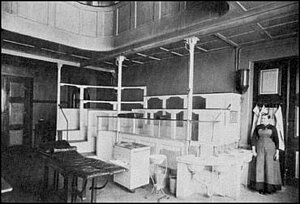Carl Caspar von Siebold
* 4. November 1736 in Nideggen (Eifel) † 3. April 1807 in Wuerzburg
1752 Philosophy studies in Cologne
1754 Paternal training as a wound doctor
1757 Training as a field surgeon in the French military hospital at Wesel
1760 Transition to the field infirmary in Wuerzburg
Position as senior assistant at the Juliusspital Wuerzburg
Medical studies
1769 Professor of Anatomy, Surgery and Obstetrics in Wuerzburg
1776 Head surgeon at the Juliusspital Wuerzburg
1805 Introduction of the first modern operating room
As the last “Scholar of the Month” of the year 2019, a member of the Siebold dynasty of doctors firmly anchored in Wuerzburg is to be honoured. Carl Caspar von Siebold received the doctorate from our university 250 years ago. He also revolutionised the operative medicine with his innovative rudiments.
The philosopher who became a doctor
Siebold, who initially embarked on a career in the humanities, finished his philosophy studies in Cologne at the age of 18. After his studies, he received medical training by his father, who was also a surgeon. During this time, he learned a lot about wound care. Subsequently, Siebold gained some practical experiences at different military hospitals and became a field surgeon.
In August 1760, he left the French military and worked as senior assistant of Georg Christoph Stand at the Juliusspital Wuerzburg. Simultaneously, Siebold started a study of medicine at the University of Wuerzburg, which he finished with honours in 1763. The prince-bishop at the time Adam Friedrich von Seinsheim then made it possible for him to further his education through a scholarship. He enabled him to go on a medical educational trip to Paris, Rouen, London and Leiden. Siebold incorporated these experiences in his dissertation and took a doctoral degree after his return to Wuerzburg. Shortly afterwards, he became the personal surgeon for the prince-bishop.
Revolution at the Alma Julia
After obtaining his medical doctorate, Siebold turned to teaching and was employed at the Alma Julia as professor for anatomy, surgery and obstetrics in 1769. With his unification of handicraft surgery and traditional academic medicine, he succeeded in reanimating the medical faculty. Consequently, the number of students increased rapidly. But it was not only in teaching that Siebold was able to achieve much with his modern approaches. As head surgeon at the Juliusspital, he established new surgical methods and hygiene standards and was committed to improving midwife training. In addition, he ensured that also Protestants were admitted to study in Wuerzburg and obliged surgeons to undertake university training. One of his most revolutionary innovations, however, was the construction of the world's first modern operating room, which opened in 1805.
The start of a dynasty
As was customary at the time, Carl Caspar von Siebold also strove to improve the status of his family and thus filled well endowed positions within his own faculty with relatives. Some of his descendants became well-known surgeons or scientist and they gained fame – not only in the medical field. His grandchild, Philipp Franz von Siebold for example, made an outstanding contribution as facilitator between Japan and the western world.
Recommended reading:
Leydhecker, Wolfgang: Der Beginn der wissenschaftlichen Chirurgie und Augenheilkunde in Würzburg durch Carl Caspar von Siebold (1736-1807). In: Würzburger medizinhistorische Mitteilungen, 1992 (10), S. 101-106.



